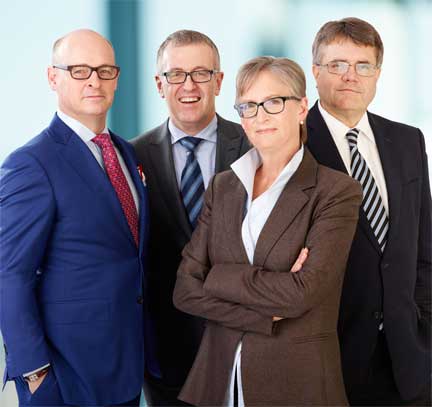
A new leadership team under a new management model will steer McMillan LLP in the direction of greater innovation, says the law firm.
 The firm is doing away with its 10-year-old CEO/COO model and bringing in a collaborative executive committee leadership scheme. The switch is aimed at bringing diverse views, skills, and expertise to the management table, says McMillan.
The firm is doing away with its 10-year-old CEO/COO model and bringing in a collaborative executive committee leadership scheme. The switch is aimed at bringing diverse views, skills, and expertise to the management table, says McMillan.
Litigation partner Teresa Dufort is the CEO of the four-member executive committee, which includes lawyers David Dunlop, Tim Murphy, and Stephen Wortley. Dufort, who is also a co-leader of the firm’s product liability defence and regulatory group, says her team has been working together extensively over the past year to develop new ideas for doing business.
The firm’s longtime CEO Andrew Kent, a restructuring and insolvency partner, will return to full-time practice.
“Innovation is a focus of the firm. It’s something that we’re independently developing,” says Dufort, adding McMillan is looking at various ways it could be innovative in its service delivery.
One of those is using technology to create a platform where lawyers can collaborate on the different kinds of work they’re doing for clients, explains Dufort. Such a platform would also allow clients to easily manage all of work the firm is doing for them.
Another priority is developing a cost-and-margin analysis model that would allow the firm to do a better job of coming up with proposals for alternative fee arrangements. This means McMillan’s lawyers would be able to tell their clients they understand what the cost of doing business in a law firm is, “which is something a lot of law firms don’t understand, I think,” says Dufort.
Although McMillan has six offices, the idea is to use “the one-office concept” when it comes to client service, she adds.
“Instead of being office-centric, which is the way I think a lot of national firms that have multiple offices can be, our thought was it would give us a lot of ability to draw from a much broader expertise in order serve clients if you could pretend that there was no geography between us,” Dufort continues.
Murphy says the legal marketplace now demands the kind of creativity and expertise that cannot be restricted by geographic boundaries.
“McMillan believes increasingly complex legal challenges require innovative and sophisticated legal solutions that are best delivered without regard to geographical or practice area boundaries through a combination of collaboration, strong project management, and technology,” he says.
Dufort says McMillan’s clients have successfully used the collaborative leadership model. “We thought it works for our clients, why wouldn’t it work for yourselves?” she says.